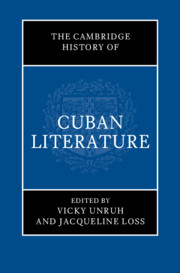Book contents
- The Cambridge History of Cuban Literature
- The Cambridge History of Cuban Literature
- Copyright page
- Dedication
- Contents
- Figures
- Contributors
- Acknowledgments
- Introduction Unfinished Histories
- Part I Literature in the Early Colony
- Part II Cuban Literature’s Long Nineteenth Century
- Part III Literary and Intellectual Culture in the Twentieth-Century Republic
- 13 The Literary Intellectuals of the Early Cuban Republic
- 14 The Invention of the Black Cuban in the Early Twentieth Century
- 15 The Fluid Expressive Communities of Cuba’s Interwar Avant-Gardes
- 16 Lydia Cabrera and Afro-Caribbean Imaginaries
- 17 The Fictions of New Urban Subjects
- 18 The Esthetics of Dulce María Loynaz
- 19 José Lezama Lima and the Orbits of Orígenes
- 20 Alejo Carpentier and Cuba’s Literary Twentieth Century
- 21 The Weighted Literary Islands of Virgilio Piñera
- Part IV The Revolution’s Literary-Cultural Initiatives and Their Early Discontents
- Part V Cuba and Its Diasporas into the New Millennium
- Epilogue
- Select Bibliography
- Index
- References
19 - José Lezama Lima and the Orbits of Orígenes
from Part III - Literary and Intellectual Culture in the Twentieth-Century Republic
Published online by Cambridge University Press: aN Invalid Date NaN
- The Cambridge History of Cuban Literature
- The Cambridge History of Cuban Literature
- Copyright page
- Dedication
- Contents
- Figures
- Contributors
- Acknowledgments
- Introduction Unfinished Histories
- Part I Literature in the Early Colony
- Part II Cuban Literature’s Long Nineteenth Century
- Part III Literary and Intellectual Culture in the Twentieth-Century Republic
- 13 The Literary Intellectuals of the Early Cuban Republic
- 14 The Invention of the Black Cuban in the Early Twentieth Century
- 15 The Fluid Expressive Communities of Cuba’s Interwar Avant-Gardes
- 16 Lydia Cabrera and Afro-Caribbean Imaginaries
- 17 The Fictions of New Urban Subjects
- 18 The Esthetics of Dulce María Loynaz
- 19 José Lezama Lima and the Orbits of Orígenes
- 20 Alejo Carpentier and Cuba’s Literary Twentieth Century
- 21 The Weighted Literary Islands of Virgilio Piñera
- Part IV The Revolution’s Literary-Cultural Initiatives and Their Early Discontents
- Part V Cuba and Its Diasporas into the New Millennium
- Epilogue
- Select Bibliography
- Index
- References
Summary
This chapter focuses on the poetry, fiction, and essays of José Lezama Lima, the Grupo Orígenes he cofounded, and its literary journal of the same name, noting their reverberations far into the postrevolutionary era. The chapter encompasses the work and poetics of Lezama, other poets in the Orígenes orbit, and the group’s journals, including their high-modernist esthetic and internationalist reach; Lezama’s view of poetry’s “epistemic role in Western and non-Western cosmologies” and “innate resistance to causal and empiricist visions of time and progress” and the group’s incursions into myth and cosmogony; the canonical or cult status later achieved by many Orígenes poets; and the critical ostracism and resuscitations Lezama and Orígenes experienced in Cuba’s postrevolutionary periods. Lezama’s 1957 essay La expresión américana is central to an in-depth analysis of the Orígenes group’s “grand mosaic of hemispheric and transatlantic creation”; Lezama’s intricate conception of a New World Baroque; and the essay’s projection, as in other writing by Lezama, of a distinctively Caribbean Baroque, even as specific Antillean referents remain unnamed.
Keywords
- Type
- Chapter
- Information
- The Cambridge History of Cuban Literature , pp. 304 - 320Publisher: Cambridge University PressPrint publication year: 2024



